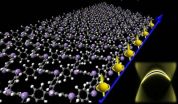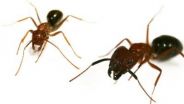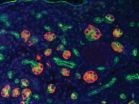(Press-News.org) About 60 percent of pediatric cancer patients experience malnourishment during treatment. At that point, patients and families have a choice: tube feeding or IV nutrition supplement. Which would you choose? A study published this week in the Journal of Pediatric Oncology Nursing shows that families' perceptions, especially of the discomfort of tube feeding, leads to choosing IV over tube – despite the fact that tube feeding is usually the better choice, associated with better gut function and lower rates of infection.
"Despite the benefits of tube feeding, we found a strong preference among families and older pediatric patients for IV feeding," says Kitty Montgomery, MS, RN, PCNS-BC, CPHON, the study's senior author and pediatric clinical nurse specialist at Children's Hospital Colorado, a clinical care partner of the University of Colorado Cancer Center.
The study surveyed 49 parents and older pediatric cancer patients. Of 14 patients, all reported preferring IV feeding over tube feeding, for example saying, "I already had a port in for chemo, so we used that for TPN," and, "Tube feeding sounds disgusting and uncomfortable."
"When nutrition support is needed, most health care teams suggest tube-feeding first. Only, we tend to find resistance to the idea from parents or patients," Montgomery says. "This study shows us the reasons for those objections and we hope will help us learn to break down those barriers to the best method of support."
Parents of pediatric cancer patients were much more evenly split between preference for tube feeding (41 percent) and IV feeding (59 percent), with the parents who preferred tube feeding frequently citing information about the procedure given by the treatment team as the reason for their choice. For example, one parent said, "Tube feeding is helpful in giving meds and not as hard on the liver and keeps the digestive system working properly." Another parent who preferred tube feeding said they, "Chose tube feedings because it helped to keep digestive system active, making it easier to adjust back to food."
"This helps us tailor our message," says Montgomery. "We see now that the biggest barrier to tube feeding is perceived discomfort, so health care professionals may have better success with patients and parents by addressing that issue. What we need to do now is learn to translate these findings into action."
### END
Tube versus IV feeding in malnourished pediatric cancer patients
CU Cancer Center study shows the best way is not the preferred way
2013-02-13
ELSE PRESS RELEASES FROM THIS DATE:
Key molecule suppresses growth of cancerous liver tumors, Mayo study finds
2013-02-13
ROCHESTER, Minn. -- A molecule already implicated in a number of diverse cellular functions can suppress the growth of tumors in the liver, a Mayo Clinic Cancer Center study has found. Its name is IQGAP1, and when the molecule is active in the cells that surround a tumor cell, this "tumor microenvironment" becomes less hospitable to cancer growth. When the molecule is deficient, cancer thrives.
Results of the study appear in the Journal of Clinical Investigation. The findings give new insight into cancer metastasis, the ability of a tumor to spread from its primary site ...
Engineers show feasibility of superfast materials
2013-02-13
SALT LAKE CITY, Feb. 13, 2013 – University of Utah engineers demonstrated it is feasible to build the first organic materials that conduct electricity on their edges, but act as an insulator inside. These materials, called organic topological insulators, could shuttle information at the speed of light in quantum computers and other high-speed electronic devices.
The study published this week in the journal Nature Communications will help pioneer a new field of research in materials science, in the same way organic materials lowered the cost and eased production of light-emitting ...
Epigenetics shapes fate of brain vs. brawn castes in carpenter ants
2013-02-13
PHILADELPHIA — The recently published genome sequences of seven well-studied ant species are opening up new vistas for biology and medicine. A detailed look at molecular mechanisms that underlie the complex behavioral differences in two worker castes in the Florida carpenter ant, Camponotus floridanus, has revealed a link to epigenetics. This is the study of how the expression or suppression of particular genes by chemical modifications affects an organism's physical characteristics, development, and behavior. Epigenetic processes not only play a significant role in many ...
Discovering cell surface proteins' behavior
2013-02-13
Contact:
Bingyun Sun, 778.782.9097, bingyun_sun@sfu.ca
Carol Thorbes, PAMR, 778.782.3035, cthorbes@sfu.ca
Simon Fraser University is Canada's top-ranked comprehensive university and one of the top 50 universities in the world under 50 years old. With campuses in Vancouver, Burnaby and Surrey, B.C., SFU engages actively with the community in its research and teaching, delivers almost 150 programs to more than 30,000 students, and has more than 120,000 alumni in 130 countries.
Simon Fraser University: Engaging Students. Engaging Research. Engaging Communities.
...
Southwest regional warming likely cause of pinyon pine cone decline, says CU study
2013-02-13
Creeping climate change in the Southwest appears to be having a negative effect on pinyon pine reproduction, a finding with implications for wildlife species sharing the same woodland ecosystems, says a University of Colorado Boulder-led study.
The new study showed that pinyon pine seed cone production declined by an average of about 40 percent at nine study sites in New Mexico and northwestern Oklahoma over the past four decades, said CU-Boulder doctoral student Miranda Redmond, who led the study. The biggest declines in pinyon pine seed cone reproduction were at the ...
Building a biochemistry lab on a chip
2013-02-13
Miniaturized laboratory-on-chip systems promise rapid, sensitive, and multiplexed detection of biological samples for medical diagnostics, drug discovery, and high-throughput screening. Using micro-fabrication techniques and incorporating a unique design of transistor-based heating, researchers at the University of Illinois at Urbana-Champaign are further advancing the use of silicon transistor and electronics into chemistry and biology for point-of-care diagnostics.
Lab-on-a-chip technologies are attractive as they require fewer reagents, have lower detection limits, ...
Study shows that problem-solving training helps mothers cope with child's cancer diagnosis
2013-02-13
A multi-site clinical trial including the University of Colorado Cancer Center shows that the benefit of Bright IDEAS problem-solving skills training goes beyond teaching parents to navigate the complex medical, educational, and other systems that accompany a child's diagnosis of cancer – the training also leads to durable reduction in mothers' levels of anxiety and symptoms of posttraumatic stress, and improves overall coping with a child's illness. Results of the study were published online last week in the Journal of Clinical Oncology.
"Earlier research shows that ...
Molecular master switch for pancreatic cancer identified, potential predictor of treatment outcome
2013-02-13
PHILADELPHIA – A recently described master regulator protein may explain the development of aberrant cell growth in the pancreas spurred by inflammation
A team from the Perelman School of Medicine at the University of Pennsylvania profiled gene expression of mouse pancreatic ductal and duct-like cells from different states - embryonic development, acute pancreatitis and K-ras mutation-driven carcinogenesis - to find the molecular regulation of these processes.
Broadly speaking, two cellular compartments are important in a normal pancreas, endocrine cells, which produce ...
Marketing technique: Activating gender stereotypes just to knock 'em down
2013-02-13
In certain circles, such as publishing, it has been well-documented that female authors have taken male pen names to attract a larger audience and/or get their book published. But should marketers actually highlight gender and activate stereotypes to sell more products?
A new study by USC Marshall Professor Valerie Folkes and Ohio State University Professor Shashi Matta looks at the issue of product perception of consumers through the lens of gender stereotypes. The researchers conclude that while traditional gender stereotypes can still have a significant influence on ...
Cities can reduce greenhouse gas emissions by 70 percent, says U of T researcher
2013-02-13
TORONTO, ON – Cities around the world can significantly reduce greenhouse gas (GHG) emissions by implementing aggressive but practical policy changes, says a new study by University of Toronto Civil Engineering Professor Chris Kennedy and World Bank climate change specialist Lorraine Sugar, one of Kennedy's former students.
Kennedy and Sugar make the claim in 'A low carbon infrastructure plan for Toronto, Canada,' published in the latest issue of The Canadian Journal of Civil Engineering. The paper aims to show how cities can make a positive difference using realistic, ...
LAST 30 PRESS RELEASES:
CU Anschutz School of Medicine receives best ranking in NIH funding in 20 years
Mayo Clinic opens patient information office in Cayman Islands
Phonon lasers unlock ultrabroadband acoustic frequency combs
Babies with an increased likelihood of autism may struggle to settle into deep, restorative sleep, according to a new study from the University of East Anglia.
National Reactor Innovation Center opens Molten Salt Thermophysical Examination Capability at INL
International Progressive MS Alliance awards €6.9 million to three studies researching therapies to address common symptoms of progressive MS
Can your soil’s color predict its health?
Biochar nanomaterials could transform medicine, energy, and climate solutions
Turning waste into power: scientists convert discarded phone batteries and industrial lignin into high-performance sodium battery materials
PhD student maps mysterious upper atmosphere of Uranus for the first time
Idaho National Laboratory to accelerate nuclear energy deployment with NVIDIA AI through the Genesis Mission
Blood test could help guide treatment decisions in germ cell tumors
New ‘scimitar-crested’ Spinosaurus species discovered in the central Sahara
“Cyborg” pancreatic organoids can monitor the maturation of islet cells
Technique to extract concepts from AI models can help steer and monitor model outputs
Study clarifies the cancer genome in domestic cats
Crested Spinosaurus fossil was aquatic, but lived 1,000 kilometers from the Tethys Sea
MULTI-evolve: Rapid evolution of complex multi-mutant proteins
A new method to steer AI output uncovers vulnerabilities and potential improvements
Why some objects in space look like snowmen
Flickering glacial climate may have shaped early human evolution
First AHA/ACC acute pulmonary embolism guideline: prompt diagnosis and treatment are key
Could “cyborg” transplants replace pancreatic tissue damaged by diabetes?
Hearing a molecule’s solo performance
Justice after trauma? Race, red tape keep sexual assault victims from compensation
Columbia researchers awarded ARPA-H funding to speed diagnosis of lymphatic disorders
James R. Downing, MD, to step down as president and CEO of St. Jude Children’s Research Hospital in late 2026
A remote-controlled CAR-T for safer immunotherapy
UT College of Veterinary Medicine dean elected Fellow of the American Academy of Microbiology
AERA selects 34 exemplary scholars as 2026 Fellows
[Press-News.org] Tube versus IV feeding in malnourished pediatric cancer patientsCU Cancer Center study shows the best way is not the preferred way



